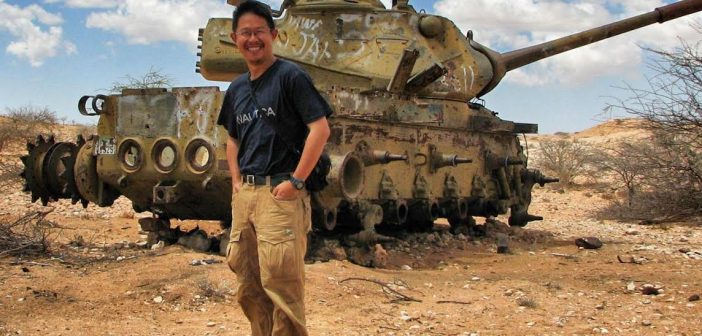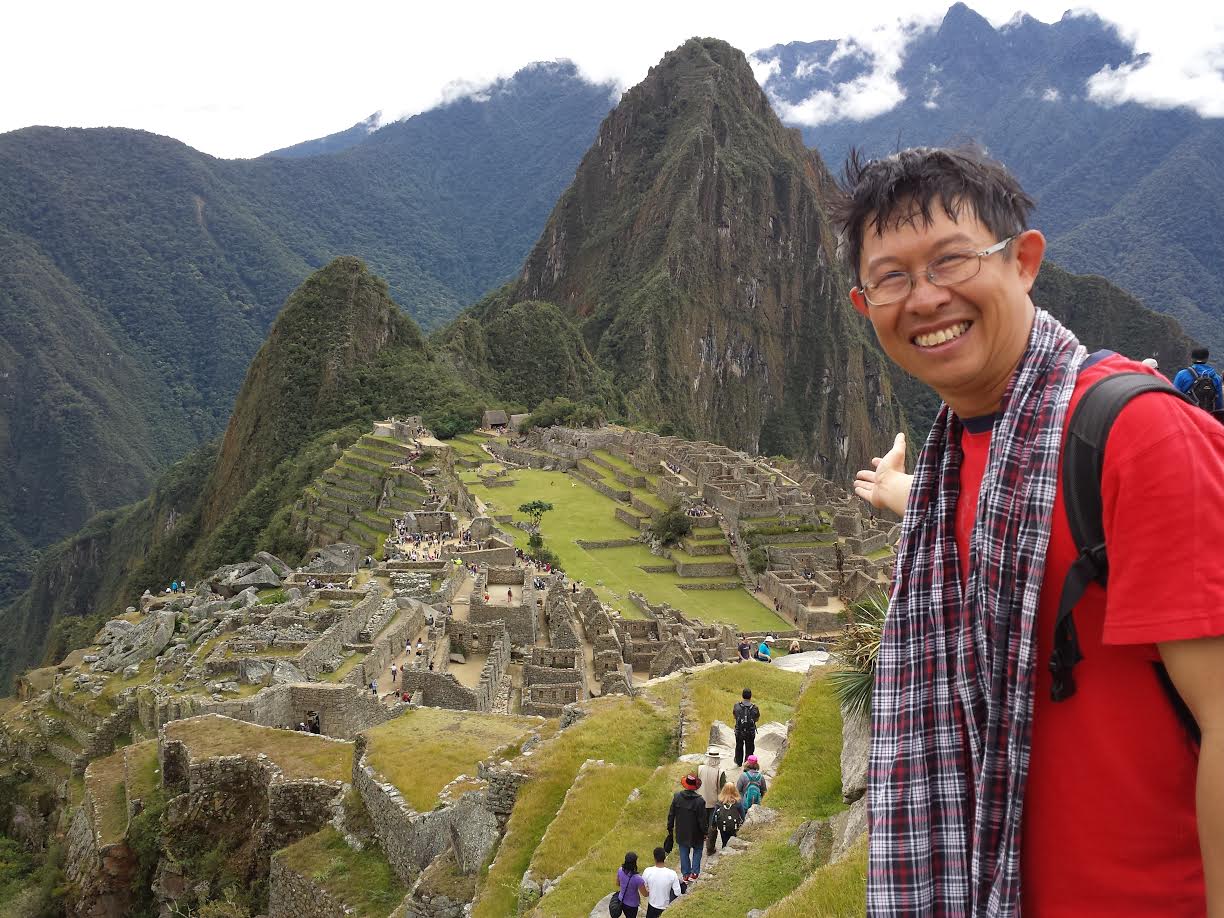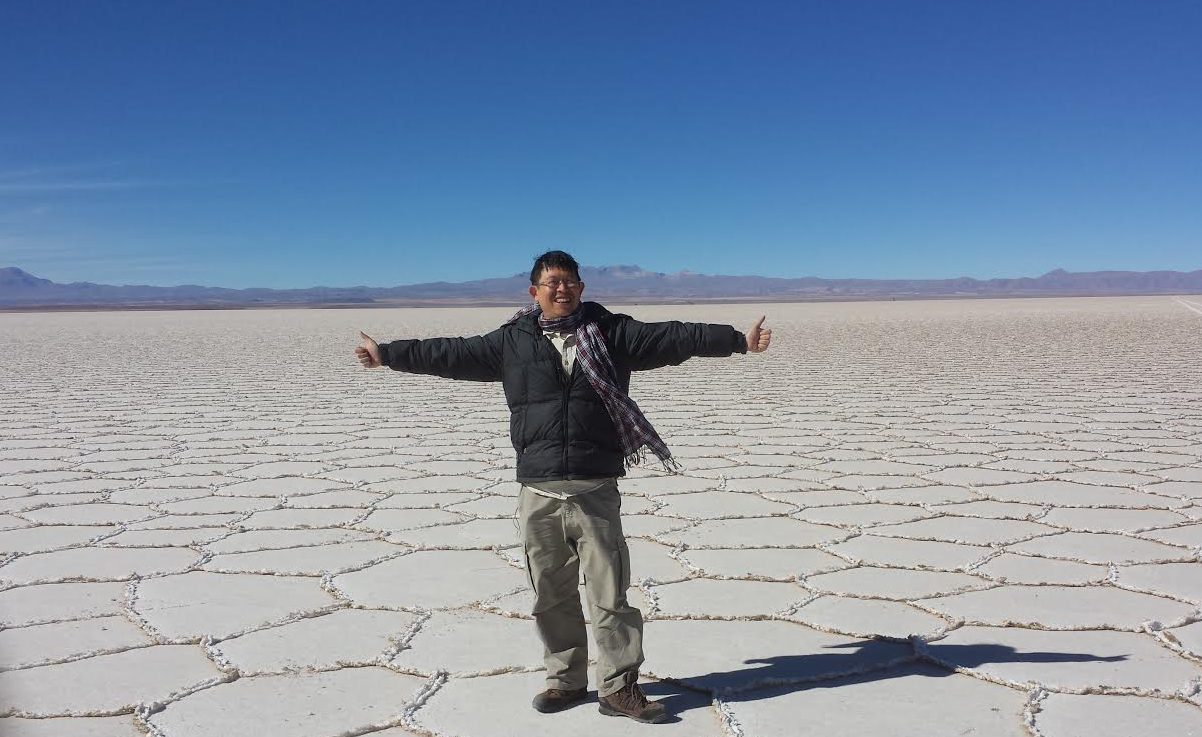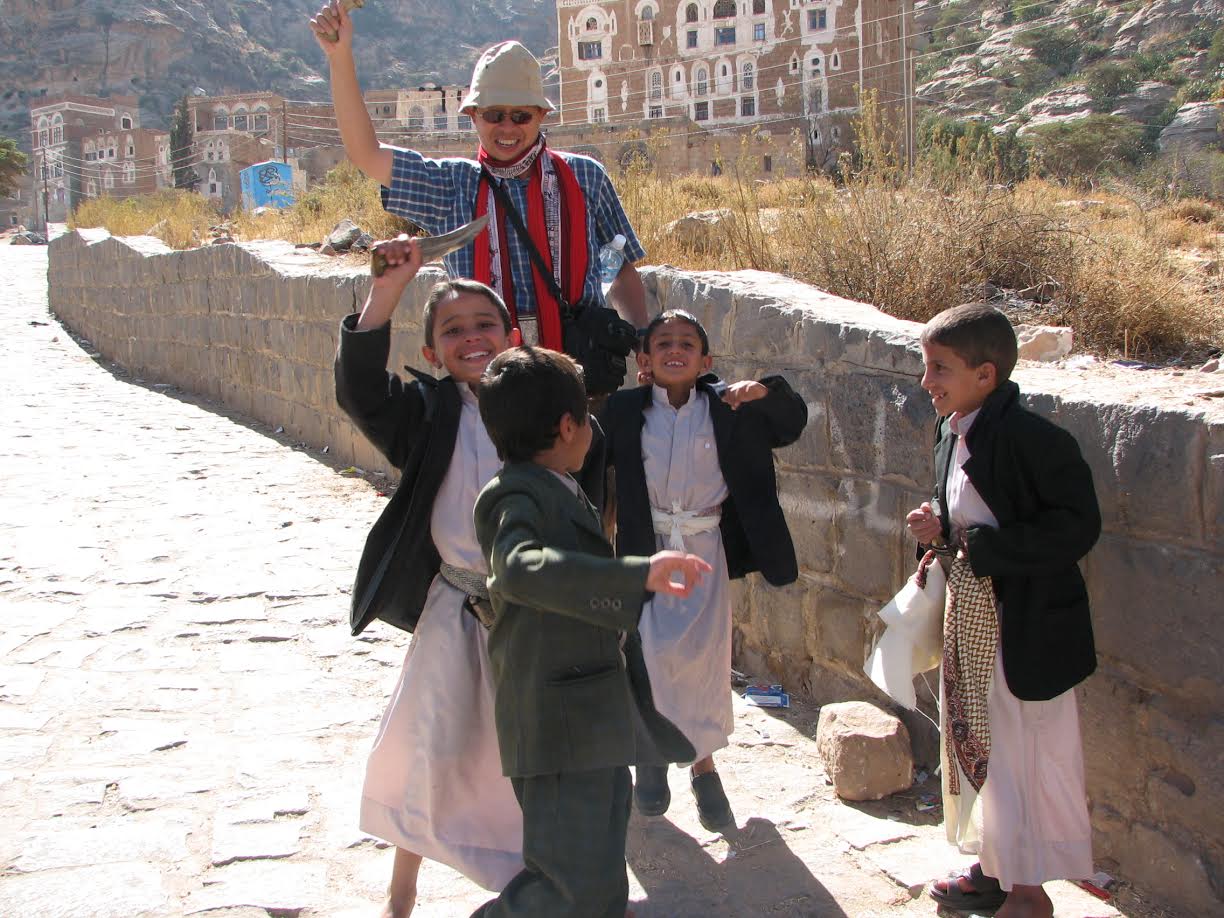There are travellers who visit mainstream destinations, and then there are travellers who have been there, done that and belong to an exclusive group that have visited every country in the world.
Tan Wee Cheng, 47, is not quite in that exclusive group yet, but he is closing in on it. If you’ve read our previous interview with a travel agency honcho who has visited about 90 countries, well, Wee Cheng has been to twice that number, having visited 181 of the United Nations (UN) member states. We caught up with the adjunct professor during a recent gathering of sgtravelcafe, a community of like-minded avid travellers he co-founded, which celebrates its 10th anniversary this year.
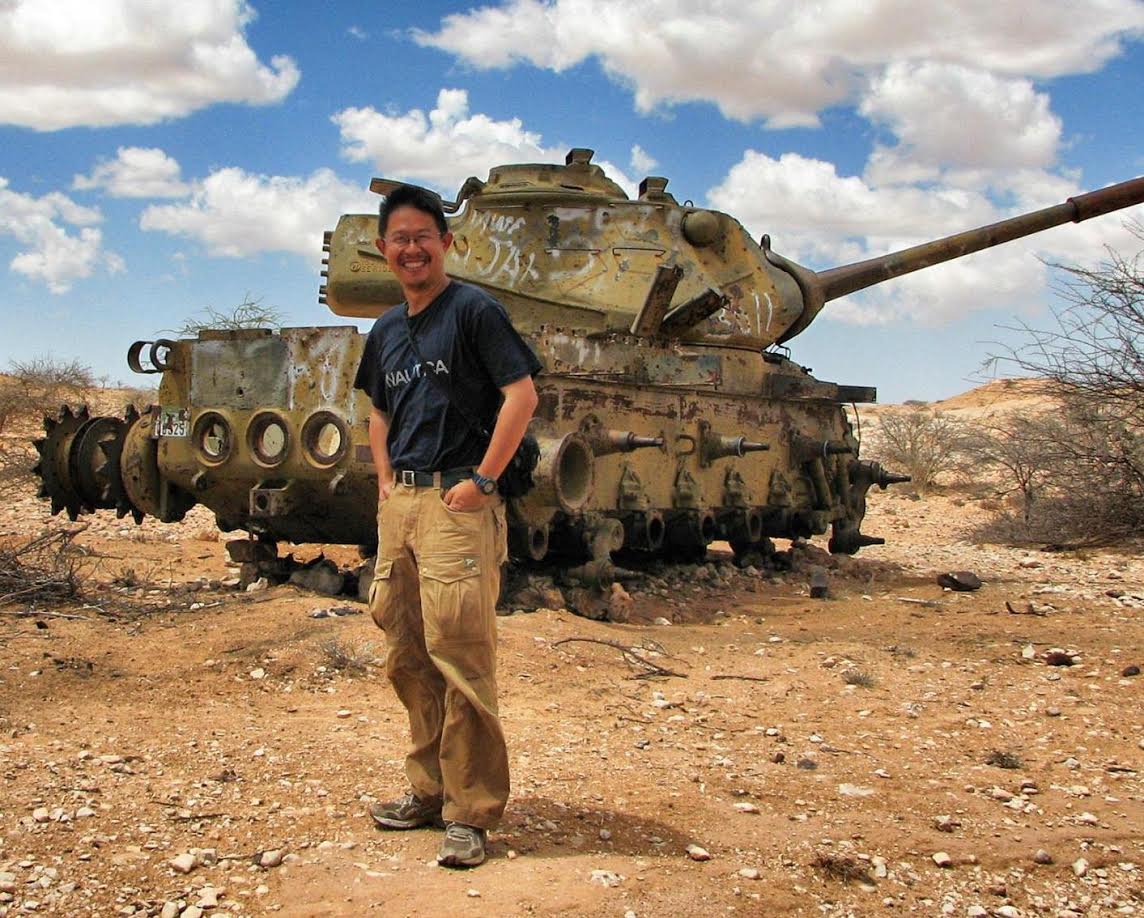
Wee Cheng takes a shot with an unused tank in Somaliland, a self-declared state seen to be an autonomous region of Somalia.
Asia 361: Nice to meet you, Wee Cheng. Tell us more about your quest to visit all the countries in the world.
Wee Cheng: I’m kind of working towards it, but I don’t have an urgent deadline. Around 2000, I reached my 100th country, Lithuania. There, I bumped into a Spanish guy who had visited every country and then it occurred to me—it’s actually possible to complete them all.
At that point I was living in London, and I had a friend, a well-travelled Australian who was my occasional travel companion. We informally ‘competed’ in our travels, and then we drew a list of countries and territories, political entities, unrecognised states, etc. There are 193 UN member states, with another 56 colonies, territories and unrecognised states in that list.
For the 193 UN member states, I still haven’t visited 12 of them— Marshall Islands, Micronesia and Palau in the North Pacific; Sao Tome and Principe, Democratic Republic of Congo, Equatorial Guinea, Angola and Nigeria in Africa; Saudi Arabia, Iraq, Afghanistan and Pakistan in West and South Asia. And I haven’t visited 15 over territories.
Asia 361: Oh dear, so how many countries exactly are there on the definitive to-do list and how many people have done them all? It’s a confusing business.
Wee Cheng: There are a few informal clubs, the Travellers’ Century Club (TCC), which defines countries in a somewhat controversial way as it counts places like Scotland, England, Wales, not sovereign states, and all islands as separate countries, which all makes up a strange list of 325 territories. And then there’s another list which includes not just UN member states but next level divisions, like provinces, states etc, which runs into some 1281 entities.
So there are actually many different lists out there. The one that I try to complete and ‘compete’ with my Aussie friend – who is now living in Singapore – consists of basically UN member states, eight unrecognised entities that have control of their own territory, for example Taiwan, and 48 odd colonies and territories. So altogether some 249 entities.
I can’t say for sure, but there are probably a lot of people worldwide who have completed all 193 UN member states; already I know of an American in Singapore who has done all of them.
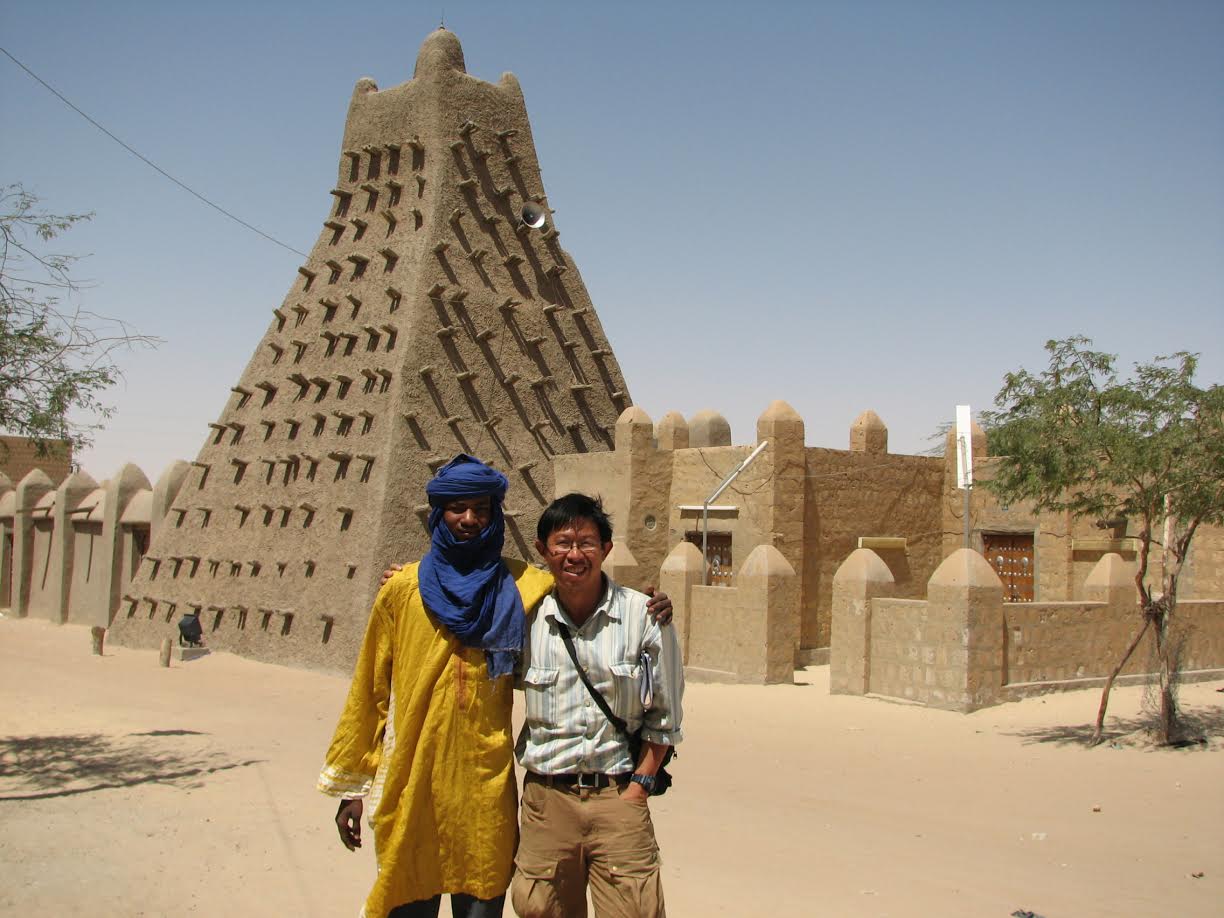
Wee Cheng poses for a photo with a local in Timbuktu, Mali. Yes, this place actually exists and is not just a myth from adventure stories!
Asia 361: Can I call you the most well-travelled Singaporean?
Wee Cheng: Yes perhaps, as far as I know.
Asia 361: How do you travel in terms of locations and priorities?
Wee Cheng: Over the past 25 years, I have tried to visit new countries, and when I go to a new country there are other countries around them and I try to combine visiting them within the same trip.
I’m an educator at the National University of Singapore, so I travel quite a fair bit during the university holidays in the middle of the year; then there are the long weekends. I don’t teach every day and there are week-long breaks each semester, so I do have quite a bit of time to travel.
Asia 361: Do you travel on a shoestring?
Wee Cheng: I used to, but not in the past 15 years. With age, you want some comfort and I don’t think I can sleep rough anymore. The other thing is once you’ve done the easier countries, you find that the remaining are fairly expensive since there is little mass tourism infrastructure. In fact, a lot of hard-to-reach third world countries are horrendously expensive. I’m not talking about Vietnam or India, but places like Angola, Nigeria and Greenland. They are difficult to get to, and you need to pay a lot to travel safely, sometimes above US$100 a night for accommodation which may not be of good quality.
Asia 361: What is your personal favourite place in the world?
Wee Cheng: I guess if you ask anyone who’s been to many countries, say 50 above, there’s no longer any favourite, and it becomes hard to rank. But even for places where there might not be much to see at one point, I’m open to revisiting because every country tends to evolve with time.
Having said that, I can name some countries I found very pleasant and surprising and I can return to. For example, Iran and Peru. There are always interesting new developments in these two countries and they are not yet over-exposed.
Asia 361: We come to the safety issue. How do you foresee completing high-risk countries like Afghanistan, Syria and Iraq?
Wee Cheng: I went to Syria when it was still safe in the mid-90s. I’ve been to Somaliland, a safer part of Somalia. While I’ve not been to Iraq and Afghanistan, there are a few sgtravelcafe regular members who have been to Iraq. So it’s possible. It’s a matter of when you do it. Kurdistan in Iraq used to be safe, it’s still semi-safe. I don’t believe in going to places where there’s active fighting. But places don’t fight forever.
Asia 361: How would you advise the avid traveller on risky regions – are there places which you would say, “just don’t go as it’s not worth it”?
Wee Cheng: My advice is to just do the research, and decide for yourself if it is safe to go. Places will not be dangerous forever. Croatia was in the middle of a war for independence in the mid-90s, and I visited it during a lull of a few weeks during that war. Back then you would never imagine that Croatia could be as safe as it is now, where it is normal for tourists to visit.
In the current situation, I’d say Syria is a no-go. I’m tempted to say Afghanistan, but frankly in sgtravelcafe, among the regulars, there are at least three people who’ve been there.
A place is unsafe when tourists become a target and you run the risk of being kidnapped. There are places like Rio de Janeiro and Haiti where there are law and security issues, but I don’t consider those as ‘Tier 1’ or even ‘Tier 2’ danger. Tier 1 danger to me would be places where there is widespread civil unrest or warfare. Tier 2 would be places with localised unrest, e.g., fighting in a few areas but not affecting the entire country. Take precautions, which include paying more for transport and getting a guide to bring you around, which help to mitigate danger.

In Palmyra, Syria circa 1996. Today, many of Palmyra’s sites have been destroyed by ISIS, such as this Arch of Triumph dating from the second century, which was destroyed in October 2015.
Asia 361: Could you highlight a memorable incident in your travels, both a positive one and also one challenging situation which you faced and you would never wish for again?
Wee Cheng: One situation I’ve spoken about many times is my encounter in Liberia. My friend and I arrived at the airport late at night without any local contacts and it took very long to clear customs. The other passengers were aid workers and officials who were picked up. Only the two of us were left at the airport and when we exited the doors, we were mobbed by groups of former child soldiers who were all trying to pull us into vehicles to drive us to the capital. We were torn between being stuck at the run-down airport (not 24 hours open like Changi!) and taking an unsafe ride to the capital with questionable drivers. In the end we were fortunately rescued by a lady official who drove us straight there.
Offhand, I can’t think of a particular positive experience to single out, though there obviously were many from my travels. But it’s always easier to remember the horrifying ones (laughs).
Asia 361: Where are you going next?
Wee Cheng: I’m going to Lombardy and Piedmont in northern Italy.
And after Italy, I’m going to Dalat in Vietnam for the long Good Friday weekend. I’ve been to Vietnam many times but never to Dalat.
Asia 361: Do you like taking photos when you travel?
Wee Cheng: I have reached a point where I just use my smartphone. I can’t even remember the model of my camera. I realise that if I focus on taking photos, I do not look at the place or appreciate the culture and the surrounding. It’s possible that I’ve been to many places without taking my own photo. It’s not the most important thing to me, and I sometimes forget. When you’ve been to more than 100 countries and are almost 50 years old, photos are not important anymore.
Asia 361: Can you share a few travel tips for our readers when it comes to planning?
Wee Cheng: Nowadays I tend to do some initial research on the wifi situation like whether to get SIM card, that sort of thing. With the Internet, you can get all sorts of information, like bus, train, plane schedules of almost any country, including the Third World.
I’m fairly detailed being an accountant by training. I think planning is half the fun – you spend time learning about the place and its history, and you then know precisely the reason why you want to visit a particular place. Some people say they don’t plan because they prefer spontaneity—you may find it hard to believe, but I find that I do not have enough time on my trips, so I have to be specific in where to go and what I want to cover.
Asia 361: Name three of your top recommended places to visit this year.
Wee Cheng: Just off the top of my head:
Cuba, because it has recently opened up, and you want to see it before mass tourism overwhelms it. Though I’m told it’s already somewhat overwhelmed.
Canada. It’s Canada’s 150th anniversary this year and there’s going to be a lot of celebrations.
Portugal, which has become quite popular. You can enjoy good food and very nice experiences for reasonable prices.
To find out more about Wee Cheng and his travels, visit weecheng.com. Visit sgtravelcafe.com to find out more about its 10th anniversary celebrations on 11 February.
Follow Asia 361 on Facebook and Instagram.
READ MORE:
- 7 European Cities That Are Mainstream for a Reason and Why You Shouldn’t Miss Them
- How to Plan a Family Holiday Trip to Hong Kong the Easy Way
- What It’s Like to Fly with the World’s Best Business Class

